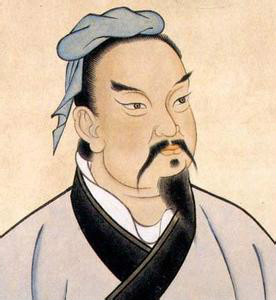
If we wish to wrest an advantage from the enemy, we must not fix our minds on that alone, but allow for the possibility of the enemy also doing some harm to us, and let this enter as a factor into our calculations.
Share this quote:
To begin by bluster, but afterwards to take fright at the enemys numbers, shows a supreme lack of intelligence.
Share this quote:
Be stern in the council-chamber, [Show no weakness, and insist on your plans being ratified by the sovereign.] so that you may control the situation.
Share this quote:
At first, then, exhibit the coyness of a maiden, until the enemy gives you an opening; afterwards emulate the rapidity of a running hare, and it will be too late for the enemy to oppose you.
Share this quote:
Ground on which we can only be saved from destruction by fighting without delay, is desperate ground.
Share this quote:
When an invading force crosses a river in its onward march, do not advance to meet it in mid-stream. It will be best to let half the army get across, and then deliver your attack.
Share this quote:
Attack him where he is unprepared, appear where you are not expected.
Share this quote:
Knowing the enemy enables you to take the offensive, knowing yourself enables you to stand on the defensive.
Share this quote:
If his forces are united, separate them.
Share this quote:
who does not know the evils of war cannot appreciate its benefits
Share this quote:
do many calculations lead to victory, and few calculations to defeat
Share this quote:
Conceal your dispositions, and your condition will remain secret, which leads to victory; show your dispositions, and your condition will become patent, which leads to defeat.
Share this quote:
The good fighters of old first put themselves beyond the possibility of defeat, and then waited for an opportunity of defeating the enemy.
Share this quote:
These military devices, leading to victory, must not be divulged beforehand.
Share this quote:
So long as victory can be attained, stupid haste is preferable to clever dilatoriness.
Share this quote:
A clever general, therefore, avoids an army when its spirit is keen, but attacks it when it is sluggish and inclined to return.
Share this quote:
Know the enemy, know yourself and victory is never in doubt, not in a hundred battles.
Share this quote:
If quick, I survive.If not quick, I am lost.This is death.
Share this quote:
There are five dangerous faults which may affect a general:(1) Recklessness, which leads to destruction;(2) cowardice, which leads to capture;(3) a hasty temper, which can be provoked by insults;(4) a delicacy of honor which is sensitive to shame;(5) over-solicitude for his men, which exposes him to worry and trouble.
Share this quote:
Therefore the clever combatant imposes his will on the enemy, but does not allow the enemys will to be imposed on him.
Share this quote: